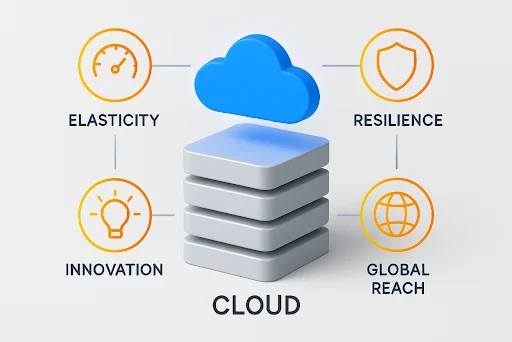Businesses argued over whether to adopt cloud computing or keep on-premises infrastructure during the early stages of digital transformation. The debate is essentially over today. The cloud is now the core of how businesses function, grow, and innovate—it is no longer an optional addition. Businesses from a variety of sectors are now reconsidering their technology strategies as ongoing cloud-driven operating models rather than discrete projects.
From Strategic Imperative to Optional Technology
The topic of discussion has changed from whether or not businesses should use the cloud to how they can best utilize it. Despite its familiarity, traditional infrastructure is becoming less and less able to match cloud architectures’ agility, resilience, and global reach. Digital competitiveness for contemporary businesses is determined by factors like cost effectiveness, speed to market, and adaptability—all of which are naturally fueled by cloud environments.
Cloud adoption is no longer solely seen by businesses as a technological choice. It is a core business strategy that influences innovation pipelines, employee productivity, and customer engagement. This realization was hastened by the pandemic. Only because of the cloud’s widespread use were remote work, e-commerce explosions, and international collaboration viable.
The Development of Cloud Computing as an Operating System
Today’s cloud is more than just a scalable hosting environment or a storage repository. It has developed into a dynamic operating model that serves as the foundation for all digital interactions. Its adaptability, which supports both experimental innovation and mission-critical applications, is its strength.

- Elasticity: The limitations of fixed hardware are eliminated as resources instantly scale in response to demand.
- Resilience: Business continuity is guaranteed by integrated redundancy and recovery procedures.
- Innovation Catalyst: Cloud-native ecosystems are ideal for emerging technologies like analytics, blockchain, and artificial intelligence.
- Global Reach: Companies grow internationally without having to invest in physical infrastructure.
These qualities change how businesses think about expansion. Cloud computing is ingrained in contemporary businesses; it is not an add-on.
Why Companies Opt for Cloud Hosting
Cloud hosting, a model that offers companies safe, scalable, and affordable digital infrastructure, is at the heart of this change. Cloud hosting, in contrast to traditional hosting environments, divides workloads among networked servers, reducing downtime and optimizing performance.
The financial benefits are just as strong. Businesses only pay for what they use in data centers rather than making large upfront investments. The cost of cloud hosting is crucial in this situation. Businesses can maximize expenditures and unlock enterprise-grade capabilities with transparent pricing models. Pricing flexibility also guarantees that companies of all sizes, including startups, SMEs, and large corporations, can access reliable infrastructure without incurring needless costs.
For forward-thinking companies, implementing cloud hosting is equivalent to implementing a plan for scalable expansion.
Managing Value and Price
When discussing cloud hosting costs, people frequently wonder if they are affordable or if the long-term costs outweigh the advantages. Assessing value instead of raw cost is where the truth lies. Businesses gain access to cutting-edge security frameworks, less need for IT personnel, and less maintenance for their hardware. Furthermore, by ensuring that businesses only pay for actual usage, consumption-based models help to eliminate waste.
In this way, pricing is a means of achieving resilience and scalability rather than just reflecting expenditure. Innovation and company growth are funded with the money saved by preventing infrastructure sprawl.
VPS Hosting for the Cloud and Beyond
Specialized models are changing how companies deploy resources as cloud computing continues to advance. Among these is cloud VPS hosting, which blends the performance of dedicated environments with the flexibility of virtualization. Businesses can obtain isolated, safe, and adaptable solutions that are suited to their workloads by dividing up cloud resources.
For businesses that need to strike a balance between cost and control, cloud VPS hosting is especially beneficial. It maintains the resilience of isolated resources while offering flexibility for scaling applications. This guarantees that companies can directly match IT capabilities to growth paths without sacrificing efficiency.
Best Cloud Server Hosting is redefining the norm.
The market’s quest for excellence is reflected in the growth of the best cloud server hosting. Basic uptime guarantees are no longer acceptable to businesses. They require improved load balancing, strengthened security, and sophisticated monitoring. The best cloud server hosting companies accomplish this by fusing customer-focused support with enterprise-class infrastructure.
In this case, performance is evaluated based on trust, transparency, and responsiveness in addition to technical benchmarks. Companies choose suppliers who offer partnerships in addition to servers, guaranteeing continuity and flexibility in a rapidly evolving digital landscape.
The Function of Trust and Partnerships
Adoption of cloud computing is as much about trust as it is about technology. How well businesses can protect data, stay in compliance, and adjust to new challenges depends on the provider they choose. Partnerships with suppliers who are aware of the unique requirements of businesses give the operating model additional layers of dependability.
Cloudingle is committed to providing the best hosting possible and is always available to assist its customers. This philosophy emphasizes the value of customer-focused services that put affordability and performance first. Companies require suppliers who will support them on their path to expansion in addition to providing high uptime.
The Cloud Opportunity in India
India has one of the world’s fastest-growing digital economies. The need for cloud-driven operating models is growing as companies of all sizes, from small startups to global conglomerates, expand. While established businesses use the best cloud server hosting to stay competitive globally, emerging businesses can grow without any obstacles thanks to affordable cloud hosting options.
Businesses can visit Hostzop’s Cloud Hosting Page to examine specialized offerings made for the Indian market. Hostzop is influencing the next phase of cloud adoption for businesses with its infrastructure, which is based on performance, affordability, and dependability.
A Future Devoid of “Optional”
Cloud optimization, not cloud adoption, will define the next ten years. The cloud will serve as the brains of enterprise innovation as edge computing, AI, and machine learning come together. Companies that view cloud as an optional upgrade will soon fall behind.
Now, how cloud-first is more important than why cloud. Organizations are integrating cloud principles into every aspect of their business, from operations to customer experience, whether through cloud hosting, agile cloud VPS hosting, or best cloud server hosting.
In conclusion
Cloud computing is now the norm in the digital age, not just a choice. Its influence extends beyond infrastructure, influencing customer journeys, competitive advantage, and strategy. Businesses that adopt this paradigm shift not only ensure operational resilience but also create opportunities for growth and innovation.
Adoption is no longer the topic of discussion. It is about partnerships that put trust first, intelligent integration, and ongoing optimization. The future of their industries will be determined by the companies that are prepared to adopt this new operating model.
Hostzop Cloud Hosting provides a doorway to the future for businesses looking for dependable, reasonably priced, and performance-driven solutions.







Your writing is like a breath of fresh air in the often stale world of online content. Your unique perspective and engaging style set you apart from the crowd. Thank you for sharing your talents with us.
Your blog is a true hidden gem on the internet. Your thoughtful analysis and engaging writing style set you apart from the crowd. Keep up the excellent work!
I’ve been following your blog for some time now, and I’m consistently blown away by the quality of your content. Your ability to tackle complex topics with ease is truly admirable.
I was recommended this website by my cousin I am not sure whether this post is written by him as nobody else know such detailed about my trouble You are amazing Thanks